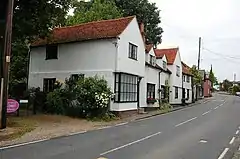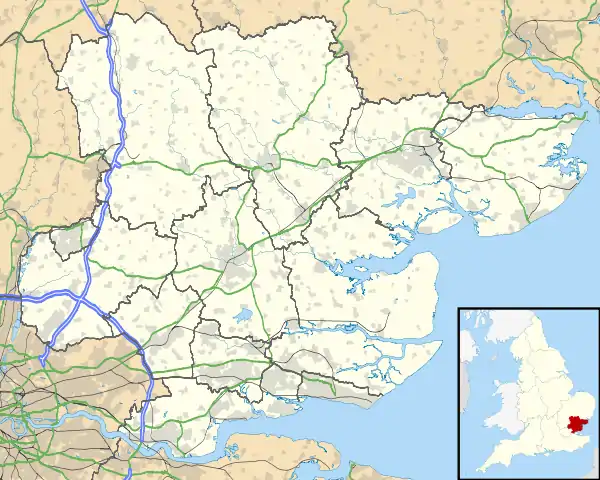Woodham Ferrers
Woodham Ferrers is a small village about 7.5 miles (12 km) southeast of Chelmsford, located between South Woodham Ferrers and Bicknacre, in the civil parish of Woodham Ferrers and Bicknacre in the county of Essex, England. The village is often shortened to Woodham by those in the area. The village is sometimes erroneously referred to as North Woodham due to its geographical relationship with South Woodham Ferrers. In 2018 it had an estimated population of 617.[1]
| Woodham Ferrers | |
|---|---|
 Church Cottages, Woodham Ferrers | |
 Woodham Ferrers Location within Essex | |
| Area | 0.330 km2 (0.127 sq mi) |
| Population | 617 (2018 estimate) |
| • Density | 1,870/km2 (4,800/sq mi) |
| OS grid reference | TL7963100050 |
| Civil parish | |
| District | |
| Shire county | |
| Region | |
| Country | England |
| Sovereign state | United Kingdom |
| Post town | CHELMSFORD |
| Postcode district | CM3 |
| Dialling code | 01245 |
| Police | Essex |
| Fire | Essex |
| Ambulance | East of England |
| UK Parliament | |
History
Originally a hermitage during the reign of Henry II the name Woodham was adopted in 1175 when it became a priory, including 60 acres (240,000 m2) of forest stretching towards Danbury.[2]
In the late 13th century the manor of Woodham Ferrers passed briefly to the Scottish noble house of Douglas by virtue of the marriage of William the Hardy, Lord of Douglas to Eleanor de Lovaine, the widow of William de Ferrers of Groby. Eleanor was a ward of Edward I, and had her late husband's manors of Stebbing and Woodham Ferrers made into a dowry for a future re-marriage. Douglas absconded with Eleanor, when she was attending to her late husband's estates in Scotland, and married her c.1288. Douglas, a significant figure on the Scottish side during the First Scottish War of Independence, had his English manors finally forfeited by 1298 when he died of mistreatment in the Tower of London. His son Hugh Douglas having been captured previously at Stebbing in 1296, by the Sheriff of Essex.[3]
There is a residence in the village that was once owned by the Bishop of York and was attacked during the Peasants' Revolt in 1381.
At the turn of the 16th century, the convent was used as a hospital until being returned to the church in 1540.[2]
Due to the proximity of both the Marconi Company and North Weald Airfield, the village was in the flight path for a number of air-raids during World War II; however it was not a direct target itself.[4]
Education
The village is served by St. Mary's C of E primary school.
Religious sites
St Mary's Church, situated at the south end of the village, was recorded in the Domesday Book in 1086.
References
- "Woodham Ferrers". City Population De. Retrieved 11 October 2020.
- "Houses of Austin canons - Priory of Bicknacre or Woodham Ferrers". Retrieved 13 July 2008.
- Fraser, Sir William. The Douglas Book, Edinburgh 1885. vol i, pp. 75,78, 93, 100,104
- "War Around Woodham Ferrers". WW2 People's War. BBC. Retrieved 13 July 2008. External link in
|work=(help)
External links
![]() Media related to Woodham Ferrers at Wikimedia Commons
Media related to Woodham Ferrers at Wikimedia Commons
